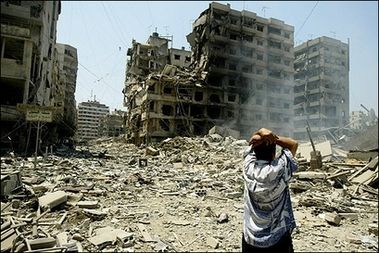 DAY 14 – BEIRUT (Reuters) – Hizbollah vowed on Wednesday not to accept any "humiliating" conditions for a truce with Israel, as the Israeli killing of four U.N. observers piled pressure on an international conference in Rome to end the 15-day conflict.United Nations, Secretary General Kofi Annan demanded an Israeli investigation into the "apparently deliberate targeting" of a U.N. post in southern Lebanon where an Israeli air strike killed the four U.N. military observers on Tuesday.Lebanon and its Arab allies will plead at the Rome conference on Wednesday for an immediate ceasefire in Israel’s war against Hizbollah guerrillas, but the United States will insist a lasting solution needs to be agreed first.
DAY 14 – BEIRUT (Reuters) – Hizbollah vowed on Wednesday not to accept any "humiliating" conditions for a truce with Israel, as the Israeli killing of four U.N. observers piled pressure on an international conference in Rome to end the 15-day conflict.United Nations, Secretary General Kofi Annan demanded an Israeli investigation into the "apparently deliberate targeting" of a U.N. post in southern Lebanon where an Israeli air strike killed the four U.N. military observers on Tuesday.Lebanon and its Arab allies will plead at the Rome conference on Wednesday for an immediate ceasefire in Israel’s war against Hizbollah guerrillas, but the United States will insist a lasting solution needs to be agreed first.
Israel, with apparent U.S. approval, has said it would press on with its campaign against the guerrillas. It also said it planned to set up a "security strip" in Lebanon until international forces deploy.Arab leaders and Annan want the Rome meeting, due to start at 0800 GMT, to call a quick halt to the war, which has killed 418 people in Lebanon and 42 Israelis since July 12. But U.S. Secretary Condoleeza Rice, who arrived in Italy late on Tuesday after visiting Beirut and Jerusalem, says she prefers to get conditions right for "a durable solution."Hizbollah leader Sayyed Hassan Nasrallah said the conflict with Israel had entered a new phase and that Israeli incursions into southern Lebanon would not stop Hizbollah rocket fire into northern Israel.
"We cannot accept any condition humiliating to our country, our people or our resistance," he said in a televised address.
Hizbollah wants a ceasefire to be followed by negotiations on swapping the two Israeli soldiers it seized in a cross-border raid for Arab and Lebanese prisoners in Israel.
The United States demands Hizbollah free the soldiers unconditionally and pull back from the border before disarming.
ARAB STANCE
Jordan’s Foreign Minister Abdelelah al-Khatib spoke of a "clear Arab stance in Rome demanding an immediate ceasefire" and Italian Prime Minister Romano Prodi said Italy’s priority for the talks was a ceasefire, followed by humanitarian assistance.
Saudi Arabia, a key U.S. ally, has blamed Hizbollah for starting the fighting, but in outspoken new comments King Abdullah said Israel risked sparking a wider regional war.
A spokesman for Prime Minister Tony Blair, echoed Rice’s line, saying diplomatic efforts should push for a ceasefire that "isn’t just another sticking plaster."
Israel has not been invited to the Rome talks and neither has Syria. Hizbollah’s main ally along with Iran.
Israel, the United States and European countries agree on the need to see Hizbollah disarmed, but some of the Europeans think this should not be a precondition for any peace deal.
Egyptian Foreign Minister Ahmed Aboul Gheit said the gap in aspirations for the talks was "really worrisome."
The Rome meeting will also seek agreement on what kind of international force could be sent into southern Lebanon — a mission fraught with danger unless Hizbollah consents.
Rice has called for a more "robust" force than the existing U.N. force of 2,000 troops. But there is disagreement on whether it should be led by NATO, favored by Israel but tricky in political and practical terms for NATO members — or by the United Nations, or simply with U.N. authorization.
Senior Israeli government officials said a 10,000 to 20,000-member force would be needed and that it could be deployed one to two weeks after Western powers approve it.
The estimate of 20,000 would be nearly double the size of the multilateral force being discussed by European powers.
"The important point in encouraging countries to join such a force is to know there is a genuine international consensus behind it," said Blair’s spokesman.
U.N. humanitarian agencies said they were still largely blocked from getting relief supplies into Lebanon and from getting wounded and very sick people to hospitals.
Lebanon says Israel’s bombardment has displaced a fifth of its population. Most of its dead are civilians.
An Israeli air strike in northern Gaza City killed one Hamas militant on Wednesday, the Islamic militant group said.
More than a dozen Israeli tanks, backed by helicopter gunships, pushed nearly 1 km (0.6 miles) into the GAZA strip and exchanged fire with militants, witnesses and security sources said. There were no immediate reports of casualties.
Israel has waged a military campaign in Gaza since June 28 to recover a soldier seized by Palestinian militants.



